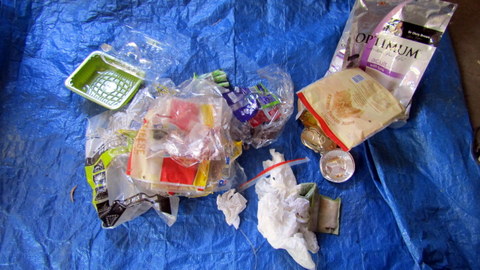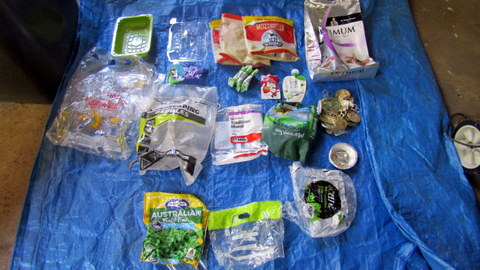Years ago we conducted a waste audit as per the process here, and we have gone a fair way to reducing the waste which we produce, almost everything recyclable is recycled, all organic waste is composted or consumed by the chooks or worms, we refuse single use plastic bag and other single use plastics where we can and have even started to reduce our recycling in favour of reusable packaging. But things change.
As the great Edwards Demming said, “what you don’t measure, you don’t control” and so I built a re-do of the waste audit into our yearly plan, but this time focussing on what we actually send to landfill rather than everything, in other words – Waste Audit 2.0.
So I dutifully spread out my tarp on the garage floor and donned my (thick) rubber gloves and prepared to do battle with our waste!
And this is what I found -
This translated into the following list of waste -
Catfood tin lids 12
Grated mozzarella cheese bags 3
Other tinned food lids (peaches x2 beetroot x 1) 3
Soap wrapper 3
Baby wipes (soiled) 3
Muesli bags 2
Childs yoghurt pouches 2
Bread bags 2
Toilet paper outer wrapper 1
Grape bag 1
Frozen peas bag 1
Dry catfood bag 1
Landscape pebbles bag 1
Chicken container (free range) 1
Easter egg box (turned out to be recyclable) 1
The way we have been working on dealing with each one follows –
Catfood Tin Lids – The difficulty with these is that they are composed of two metals; the ring pull is aluminium and the rest of the lit is steel. We have dealt with it by cutting off the ring pull and recycling the majority of the steel lid. The remaining small amount of aluminium and attached steel is still junked unfortunately. This is still considerable better than the plastic pouches which were the containers for the only cat food our black cat would eat. He has passed on and our remaining cat is OK with the tins (thankfully!)
Grated mozzarella cheese bags – this one has become a bit problematic. Finding this kind of cheese without some form of plastic packaging has proved to be somewhat difficult. Yes, I know, one option is to make it ourselves and I have tried it. The result was……….interesting. So, as of today, the search continues!
Other tinned food lids – See catfood tin lids above at least as far as the peaches go. The beetroot tin lid needed to be taken off with a can opener and so was straight steel that now gets put into the empty tin and the tin bent over a bit so it can’t come out. The whole shebang then gets put into the recycling.
Soap wrappers – this has proved remarkable easy, we have found a manufacturer and supplier of soap in our area, which we have been able to buy a cardboard box of “seconds” soap remarkable cheaply. This has eliminated the soap wrap problem entirely. We also do make our own soap, but the soap ingredients come packaged as well, of which some is recyclable, some is not. So we would still be generating waste if we were making our own soap exclusively, although it would be somewhat reduced.
Baby wipes – also an easy one as they turned out to be compostable (my bad!)
Muesli bags – we have sources a bulk supplier of all sorts of goods (https://thesourcebulkfoods.com.au/) and we can take in our own cereal container which holds about a kilo of muesli at a time.
Childs yoghurt pouches – we are currently experimenting around making small amounts of yogurt. More on this as things develop.
Bread Bags – we do produce some of our own bread but also buy it in too. We have found a local bread supplier (who makes wonderful bread!!!) that packages in a paper bag with a cellophane panel and so is completely recyclable and have certainly been enjoying that recently. There are also other suppliers like Bakers Delight who can supply unpackaged bread into your bag or container.
Toilet paper outer wrapper – we have sourced a supply of toilet paper which is made in Australia and has a recyclable outer paper covering.
Grape bag – this proved a bit problematic as all of the suppliers at our local shops give you grapes in bags, but by going to a shopping centre a bit further away we get access to a fruit and vego shop which has unpackaged grapes which we buy in our own fabric produce bags.
Frozen peas bag – This is a rare thing for us, we usually grow beans in the summer and peas in the winter but we are currently in a dry period between it being too cold for beans and the peas coming into production. Admittedly, due to a glitch in our system I planted the peas somewhat later this year.
Dry Cat Food – a bit of a conundrum this one, if we were to go for bulk purchase, with only one cat, the crunchies become stale long before they are used up, so it does not work. No fix for this one at present.
Landscape pebbles bag – another one-off to fill a particular need, not likely to be repeated.
Chicken container – We did have a local supplier of free range chicken bits which we could pick up in our own containers. Unfortunately they have recently ceased to stock them because of low demand, which was very frustrating. We need to go to a bulk meat supplier and get a meat supply which we can pack off into our own containers. Our meat consumption has decreased considerably in recent time such that we only have a couple of meat meals a week, so it is not the problem it once would have been.
So, there you have it! I found it quite educative (if not particular pleasant) to carry out this research into our rubbish and plan to do it at least once a year to keep track of how well we are dealing with our waste.




